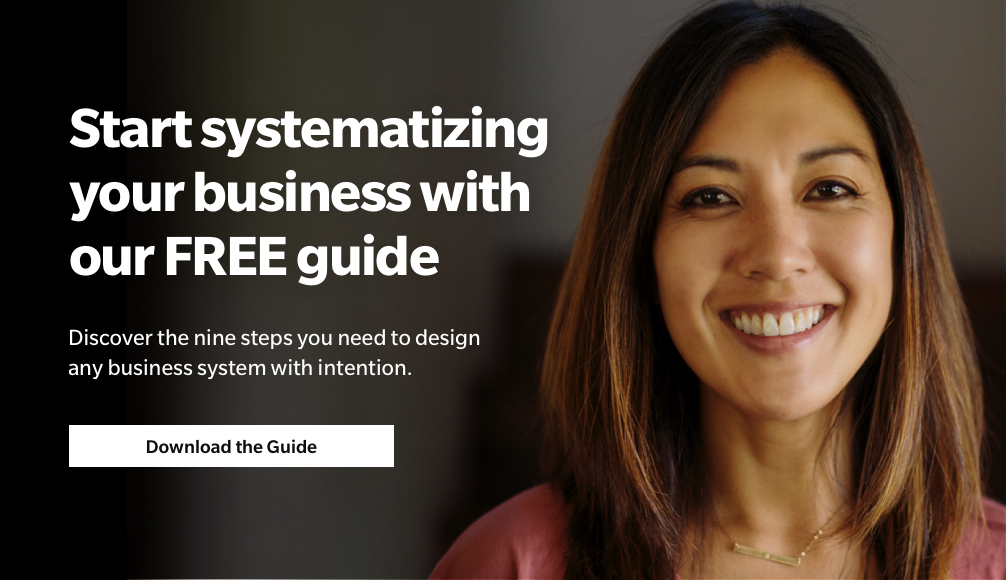When small business owners come to us for help, one of their most common questions is, “How do I create the systems my business needs to run the way I want it to?” And you know what? We love to hear that question. It means that those leaders are ready to take the right steps to work on their businesses, not in them.
Our foundational idea of developing your business from a systems perspective is this: If you think about your business as if you were building it as a prototype—as a franchise business would—how would you do it? What sits behind that question is another: What is your “‘way we do it here?” Systems are there to support your proprietary way of doing business and make it happen by design. So if you ever want to shape a company that produces consistent results and isn’t people dependent, you absolutely need well-designed systems: It’s one of the seven principles of building a business that works.
But before you start developing systems, you need to understand—and very likely change—how you think about them. Here are five key concepts to inspire and inform your way of thinking about systemization so you can start building your systems strategy.
Five key principles of business systemization
1. How you think about your business is how you end up doing business
Each business owner takes on three distinct personalities in how they think about—and work within—their business. The Technician focuses on the day-to-day work of making, selling and delivering it, with little or no ability to step back and look at the bigger picture. The Manager focuses on putting people and systems in place to achieve results, tasking themselves to analyze data and make continuous improvements. And the Entrepreneur is the visionary—the business owner who defines the business and focuses on closing the gap between where the business is today and where they want it to be. By understanding these personas, you can check in with yourself and assess where to direct your attention so that your business can grow.
2. Every business has the same seven systems
There’s no business like your business. But at the same time, no business is unique. Each is composed of Seven Essential Systems: the disciplines of Leadership, Marketing, Finance and Management, and the activities of Customer Fulfillment, Lead Conversion and Lead Generation. While the four disciplines are more universal and underline your business strategy, the three activities tend to be more customized, based on how you do things in your business. Your seven systems create your way we do it here, and by actively engaging with them, you’ll make your company stand out even more.
3. Building a systems-based business is a strategy decision
If you can’t point to documented strategies for how each of these seven systems should work in your business, chances are they aren’t producing the output you want. No matter what results you want to achieve, you need systems that are intentionally designed—rather than developed by default—to reach them. By building a systems-based business, you’re making the strategic decision to grow a business that works for you, so you can do more of what you love.
4. Systems create more life
The idea of systems might seem boring or too restrictive to you—we get it! Not everyone wants to think about life as a series of repetitive tasks. It can feel a little counterintuitive, but by implementing systems, you’ll be able to free yourself both in and outside of your business. Think about your systems-design like building an elegant and well-oiled machine. With a machine that performs just as it’s supposed to, you’ll not only be able to produce consistent, reliable outcomes and sustainable growth, you’ll be able to step away from working in the business and focus on being the leader it needs you to be.
5. On time, every time, exactly as promised
Once your carefully crafted systems are flowing smoothly, you won’t be the only one to notice it. Customers will be drawn to your business’s promise to satisfy a need or solve a frustration, and your ability to provide prompt, consistent results will satisfy them and keep them engaged. They’ll want to return again and again because your systems allow you to always deliver your Brand Promise.
With these concepts in mind, you can move forward and start the work of designing your systems with intention. If you’d like support with this, download our free Systems Guide or reach out to us. We’re here to help.




Comments